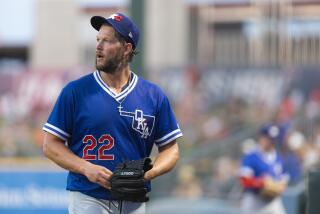COMMENTARY : New Baseball Life in Houston and Seattle
For too many years, Astros fans had to cope with a club that usually was a no-hope, bargain-basement operation.
But overnight the Astros have rebuilt their pitching staff with the free-agent signings of two local boys made very good--Doug Drabek and Greg Swindell. A shortstop could be next. Add in the foundation of solid young talent nurtured through the resourcefulness and good work of General Manager Bill Wood and his assistant, Bob Watson, and you have a club on the verge of contending in the N.L. West.
Then there’s Seattle, where the Mariners were on the verge of extinction just months ago. All of a sudden, the moribund organization is energized with Lou Piniella as the new manager, Norm Charlton as the expensive new reliever, Chris Bosio as the first major free-agent pickup in the franchise’s history and the promise of more aggressive moves to find a right-handed hitter and perhaps another starting pitcher.
What do the Astros and Mariners have in common? New owners. And the change of atmosphere with Drayton McLane Jr. in Houston and the Nintendo group in Seattle underscores the timeless truth that the way a baseball franchise operates often has less to do with the size of its market, as is repeatedly claimed in baseball’s ongoing economic debate, and more with who is the owner and what is his or her philosophy.
It might be easier for the large-market clubs with their substantial local TV revenue and fan base to turn a profit. But when the owner of a club is so wealthy that losing a few million on his baseball team is not a worry, the market suddenly becomes meaningless. And similarly, when an owner is strapped for cash or unwilling to spend, it doesn’t matter if the club is in a big market.
A prime example has always been the Kansas City Royals. They are in one of the smallest markets in the major leagues. However, their payroll has always been healthy as has been their pursuit of major free agents. This year is no exception with the Royals signing right-hander David Cone and shortstop Greg Gagne.
The reason is that Ewing Kauffman, the Royals’ owner, is worth somewhere around $500 million. Losing $8 million or $10 million on his baseball team isn’t really a concern if it means he can win another pennant.
Before McLane came along in Houston, John McMullen ran the Astros to squeeze as much as he could from the franchise. McLane wants a World Series in the Astrodome. And as Manager Art Howe said after the Drabek and Swindell signings, “I’ve had Christmas come twice already.”
In Seattle, Piniella was hired at one of the biggest managerial salaries in baseball, and the go-ahead was given to shore up the pitching by trading for Charlton and signing Bosio. All this from one of baseball’s classic small markets.
By contrast, the Pittsburgh Pirates, a small-market team whose ownership needs to watch the bottom line, have dropped $15 million worth of players’ salaries. The cash-poor owners of the Padres have been shedding contracts in San Diego, a limited market closed from potential growth to the south by Mexico, to the west by the Pacific Ocean and to the east by desert and mountains. And in Philadelphia, Owner Bill Giles insists on keeping the large-market Phillies at a strict salary budget that keeps them in the bottom quarter of all payrolls.
Doomsayers say baseball will someday run out of millionaires who are willing to lose money in smaller markets in exchange for competing for star players. But as long as the Drayton McLanes of the world keep bellying up to the bar in hopes of winning a ring, the small market vs. big market debate won’t ring entirely true.
The Yankees’ signing of shortstop Spike Owen went largely unnoticed. But it gives New York some needed veteran stability up the middle. And at the same time, it means the Expos will be looking for some veteran players. Montreal is confident Wilfredo Cordero can do the job at shortstop. But the Expos have become very young, and to win it all they will need a few veteran faces added to their depth. . . . With half their 1992 roster gone, the Pirates need to acquire some bodies. But just as big a concern is pitcher Zane Smith, who had shoulder surgery. If he is ready for the season, Pittsburgh’s starting pitching should be competitive. But if Smith has trouble returning, then the Pirates will need to find a veteran pitcher.
As the winter meetings opened, several general managers lamented the relative absence of trade talks because teams were preoccupied with free agents. That’s not a new development. Ever since the end-of-the-meeting trading deadline was eliminated, the meetings have been largely held hostage by the free agents. Many baseball people have suggested the past few years that the meetings be moved to late January, when the major free agents have been signed.
More to Read
Go beyond the scoreboard
Get the latest on L.A.'s teams in the daily Sports Report newsletter.
You may occasionally receive promotional content from the Los Angeles Times.










